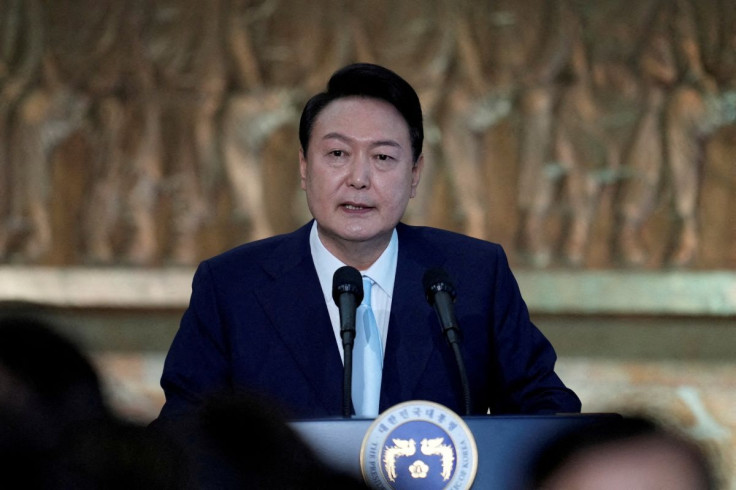Economic Woes Deter Korean President Yoon From Celebrating Civic Poll Victories

Less than 25 days into office, South Korean President Yoon Suk-yeol said on June 3 that the economic situation in Asia's fourth-largest economy was too grave to talk about the civic poll victories of his party members in June 1 elections.
Though the ruling People Power Party bagged 12 of the 17 key mayoral seats in the civic elections, strengthening the mandate of Yoon, who assumed office May 10, the severe economic issues staring at the 11th largest economy in the world have turned into pressing issues for the new 61-year-old president.
"Our lawn currently lies in the path of the typhoon that includes our economic crisis. It's not the time to be talking about a political party's political victory," he told reporters.
The new president has his own reasons for being tight-lipped about his party's major victory because, on the same day, the government released data that showed consumer prices jumping by 5.4 percent in May from a year earlier. It was the steepest on-year increase since August 2008.
The highest increase since August 2008 is compounded by inflation growth that exceeded 5 percent for the first time since a 5.1 percent hike in September 2008.
Core inflation, excluding volatile food and oil prices, advanced 3.4 percent year-on-year in May, the highest since February 2009.
Prices of petroleum products increased by 34.8 percent in May, which were 34.4 percent year-on-year in April. South Korea's benchmark Dubai crude averaged $108.16 per barrel, up 63 percent from a year earlier. The prices had a yearly high of $127.86 per barrel on March 9 as South Korea depends mainly on imports for its energy requirements.
After the southeast nation lifted the Covid-19 restrictions, personal services prices and the cost of living, especially dining out, have hiked many-fold. Personal services rose 5.1 percent, the fastest since December 2008, while the cost of dining out increased by 7.4 percent. Prices of food products, mainly agricultural, livestock and fisheries items, rose 4.2 percent from a 1.9 percent rise in April.
To tame inflation, last month the Bank of Korea (BOK) raised the policy rate by a quarter percentage point to 1.75 percent, the fifth rate hike since August last year. BOK Governor Rhee Chang-yong has hinted at further rate hikes. Rhee has already taken steps to temporarily remove tariffs on the import of key food ingredients.
Under the 3.1 trillion won ($2.5 billion) plan, the country has exempted import duties on key food ingredients like cooking oil, pork and flour until the end of the year. The government hopes to lower consumer prices by 0.1 of a percentage point under this measure.
As the country is passing through the worst economic miseries, Finance Minister Choo Kyung-ho June 2 asked local companies not to hike the prices of products and wages so as to prevent upward pressure on already high inflation.
Korea's exports, measured mainly by semiconductor and automobile manufacturing volume, thrived amid the pandemic but were marred by unexpected risk factors due to the crisis in Ukraine and lockdowns in China.
On the export front, South Korea has posted a stellar performance as it has been registering continued growth for the past 19 months despite soaring global commodity prices and compounded by years of global supply chain disruptions.
However, imports have exceeded exports every month since June last year, mainly caused by high energy costs, including crude oil and liquefied natural gas (LNG), which were $14.75 billion in May, an astronomic hike of 84.4 percent month-on-month.
The country's robust export performance is being overshadowed by a spike in key commodity import prices and Korea suffered a trade deficit of $1.71 billion (2.12 trillion won) in May, the government said on June 1.
According to data from the Ministry of Trade, the nation's exports stood at $61.52 billion in May, up 21.3 percent compared with a month earlier. However, the second-largest export figure of all time was undermined by imports rising to $63.22 billion, which resulted in a $1.71 billion trade deficit -- the second such deficit after April's $2.51 billion.
The sustained trade deficit over the past two months will have a negative impact on the country's export-reliant economy, due to the soaring prices in key input materials, including oil, minerals, as well as food, coupled with global geopolitical volatility, fuelled by the Russian invasion of Ukraine and the post-Covid-19 economic recovery.
For an economy powered by the export of final goods and services after importing intermediate goods, an annual trade deficit this year is a probable scenario.
























